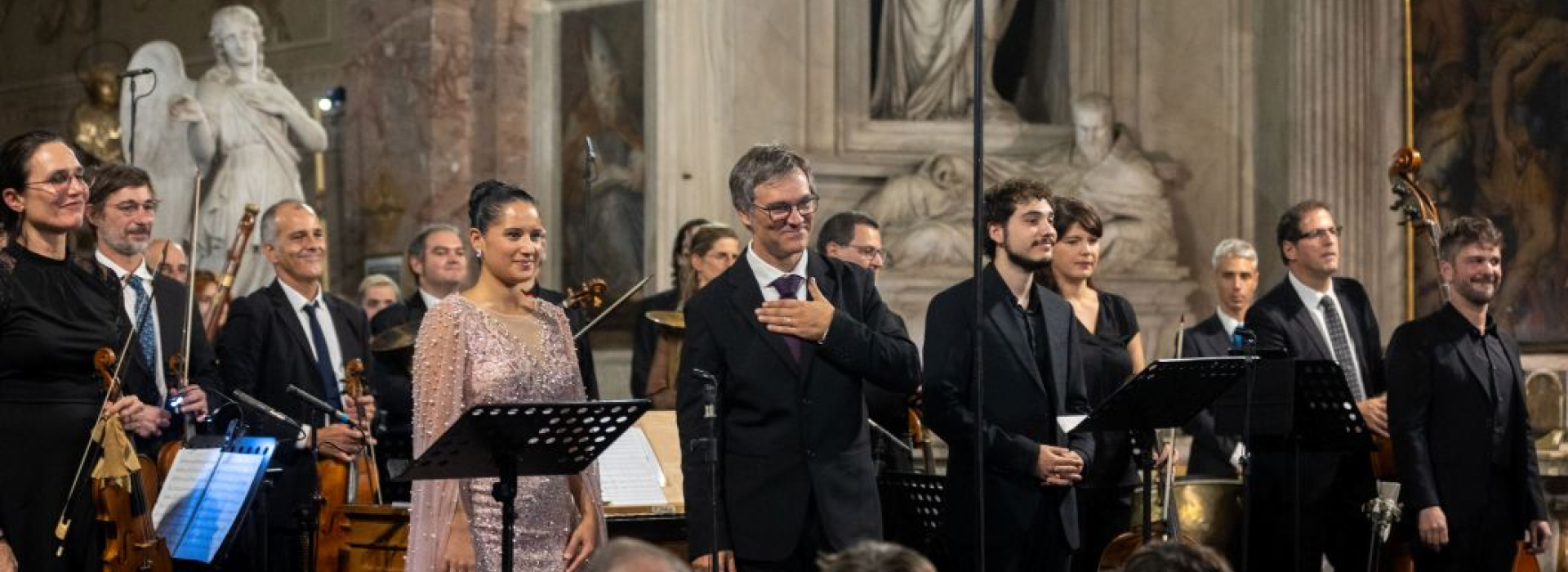TERRADELLAS TAKES CENTRE STAGE

The second day of this extraordinary expedition of the Perelada Festival to Rome commemorated the legacy of Domènec Terradellas, one of the most internationally renowned Catalan composers of the 18th century, who had close ties to the Eternal City.
Terradellas returns to the Eternal City
The church of San Pietro in Montorio — an iconic space full of history and art and the home of the Spanish Embassy in Italy — was this afternoon the setting for the Terradeglias concert in Rome. The evening highlighted the deep connection of Domènec Terradellas (1713-1751), one of the few Catalan Baroque composers with an international profile, to Rome, which was the stage for a decisive period in his career and where he established himself as a master of sacred and operatic music. Although today his name may be unknown to the general public, his compositions, some of which had remained unheard for almost three hundred years, are once again being performed in the very place where they were written, rescuing a musical legacy that is often forgotten.
The programme featured three of his most important works: A los dolores de María Santísima, an aria of intense lyricism and great expressive force that transforms Merope's lament for the death of her son into Mary's lament at the death of Jesus; the Dixit Dominus, notable for its rhetorical and dramatic richness; and the Laudate pueri, whose refined and elegant composition fully reflects the international spirit of its time and the mark of the Italian style. The last two pieces were created for the chapel of Santa Maria di Montserrato, the Catalan church in Rome. Copies are preserved in the chapel and other archives in Spain and the rest of Europe, testament to their contemporary dissemination beyond the borders of Italy. These pieces, which at the time placed Terradellas at the centre of the musical life of Rome, were performed once more in all their vitality thanks to an exceptional ensemble, presenting music that displays a brilliant Baroque aesthetic and at the same time foreshadows Classicism.
Soprano Sara Blanch and countertenor Juan Manuel Morales led a vocal line-up that, together with the ensemble Cantoría, specialized in polyphony and early music, delivered a vibrant and rigorous performance. Blanch, a light soprano in full command of her vocal powers and endowed with solid coloratura and high notes, offered an impressive display of virtuosity and expressiveness, with moments of special vocal and dramatic brilliance for the singer from Darmós. An artist-in-residence at the Festival Perelada in its 2016 edition, she returned for this special edition in Rome, a country where she enjoys great recognition. The period-instrument ensemble Vespres d’Arnadí, under the direction of Dani Espasa, completed the formation with an orchestrally brilliant version, meticulously conducted from the harpsichord. Renowned for their role in the recovery of the Baroque musical heritage, they once again demonstrated their excellence in this celebration of the legacy of Domènec Terradellas, with an interpretation that combined historical rigor and a communicative power capable of moving the audience. The union of voices and instruments, in a space so steeped in history as San Pietro in Montorio, offered the 110 attendees an experience of profound spirituality and musical beauty.
The concert was attended by H.E. Mr. Miguel Fernández-Palacios, Ambassador of Spain to Italy; the Right Honourable Mr. Salvador Illa, President of the Government of Catalonia; the Honourable Ms. Sònia Hernández, Minister of Culture of the Government of Catalonia; Mr. Luis García Montero, Director of the Instituto Cervantes; the Illustrious Mr. Miquel Noguer, President of the Provincial Council of Girona; Mr. Miquel Brugat, Mayor of Peralada; the Reverend Father Manel Gasch i Hurios, Abbot of the Monastery of Montserrat; and Father Jordi-Agustí Piqué i Collado, Prior of Montecassino.
Terradellas' career combined moments of brilliance with fascinating events: from his early studies in Barcelona with Francesc Valls, through the Conservatorio dei Poveri in Naples with Francesco Durante and Gaetano Greco, to his great success in London, where his operas Mitridate and Bellerofonte vied with Handel and introduced London audiences to previously unheard effects, such as the crescendo. His death in Rome in 1751 is surrounded by legend: in the 19th century it was said that he had been murdered by his rival Niccolò Jommelli, although there is no documentary evidence to support the story.
The rediscovery of the music of Terradellas today in Rome is the rediscovery of the legacy of an often forgotten master, and created a dialogue between the Catalonia of the 18th century and Rome, showing the universal relevance of an oeuvre that can still move us. From his religious music, which spread across Europe and to America, to the operas that can still surprise with their innovativeness and expressiveness, Terradellas' work has a richness that still speaks to us after being unheard for three hundred years.
A conference on continuity and dialogue
Before the concert, the Royal Academy of Spain in Rome hosted the conference entitled Millennium Montserrat: from Terradellas to Vivancos. The session began with words of welcome from the Director of the Royal Academy of Spain, Ms. Maite Méndez, and the Director of the Institut Ramon Llull, Mr. Pere Almeda. This was followed by a dialogue between Father Jordi-A. Piqué, OSB, monk of Montserrat and Prior of Montecassino, the musician and musicologist Sergi Casademunt i Fiol, and the composer Bernat Vivancos, who reflected on musical continuity across the centuries, the Benedictine tradition, and the creative spirit passed on from one generation to the next. Piqué underlined the importance of the monastic community as a space where music is an integral part of spiritual and cultural life. Vivancos added his perspective as a contemporary creator, trained at the Escolania de Montserrat, acting as a bridge between tradition and modernity. Finally, Casademunt added a musicological perspective on the legacy and contemporary relevance of Domènec Terradellas. The session emphasised the continuing relevance of a heritage that has been of international significance from the time of Terradellas to the present day.